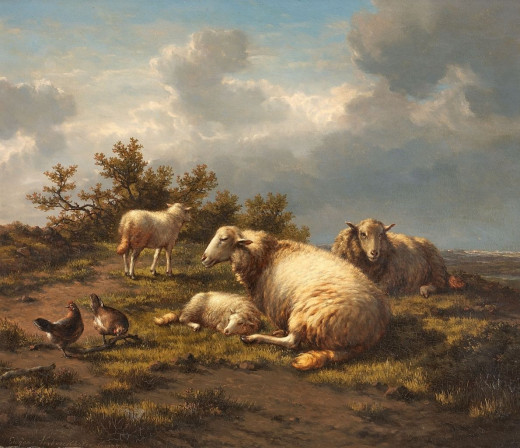Do You Know Who You Are?

Identity Crisis
We identify ourselves by a myriad of labels as humans beings. Whether it be with political labels (I'm a Republican/Democrat/Libertarian, etc.), ethnic labels (I'm a Zulu/Karen/Cherokee,) national labels (I'm an American/Japanese/Colombian, etc.), or social labels (I'm a redneck/yuppie/socialite, etc.), we have a name to stamp upon anyone and everyone. Christians even have labels for themselves to tell other believers with what stream of Christianity they identify. (Though some of those labels have lost their original meaning—a little study of church history will tell you that; however, that is for another article at another time!) What I often find to be very lacking amongst we who follow Jesus is a knowledge of who we are in Him. The most important labels—or better said, realities, for they are not just on us, but in us—we should bear are the ones He has given to us. They are truth spoken over us by God Himself. Many times I hear my fellow believers saying disparaging or despairing things about themselves which give me cause to wonder: don't you know that is not whom you have been made to be in Christ? Or sometimes I myself get stuck in a way of thinking about myself that is opposite of whom my Father in Heaven says I am. How we perceive ourselves as Christians should stem from what the Scriptures say about us, rather than what the world around us, the enemy, or even our own minds say. If you are struggling in your mind and heart over who you are as a Christian, then I want to help you to better understand all of the wonderful things God has spoken over you as His child. He has given you an identity in Him, and He has recorded that identity in His word. I am presenting here a list of many of things we as believers have become in Jesus, along with a basic explanation of what I understand those things to mean. I would encourage you to look up the passages listed, and read the verses around them as well, for the context of a verse gives us greater illumination as to what the Lord is telling us in that passage. Know also that these realities that God has spoken over you as His child are a common identity you share with all other believers. You walk with them as a part of His Kingdom family. Be blessed and encouraged as you meditate on whom you are as a child of the living God!
(Note: I have used the New American Standard Bible in most cases to assemble this list, so if you use a different translation, the terms may not be exactly the same [for example, "jars of clay" in the NIV versus "earthen vessels" in the NASB in 2 Corinthians 4:7]. The basic ideas and principles remain, however, in spite of what is usually slightly different terminology.)
The Salt of the Earth
(Matthew 5:13)
Jesus calls those who follow Him "salt": the "salt of the earth", to be exact. The people who belong to Him are called to be different from the world around them, so that they might have a godly impact on the lives of unbelievers. Our being different as Christians is not always a comfortable thing, for sometimes unbelievers do not like our following what God says. Yet we must not let the discomfort intimidate us and keep us from living as He has called us to live. Consider what Jesus says after calling us the salt of the earth: He says if salt becomes tasteless, it is not good for anything anymore. Natural salt is meant to season food; if it lost its flavor it would no longer have a purpose. In the same way, we who are spiritual "salt" lose our purpose for being here on earth when we do not "season" the world around us with the life of Jesus. We are not meant to blend in—in other words, taste the same—but to stand out so that those who do not know Jesus would gain that same saltiness. So, be "salty" every day by spreading the life of Jesus in your words, attitudes, and actions. Let the people around you taste and see that the Lord is good!

Sheep
(John 10:1-30)
Jesus calls Himself the Good Shepherd in this passage from John, and those who belong to Him His sheep. As one of His sheep, you are cared for just as literal sheep are cared for and guarded by their shepherd. He leads you in the way you need to go, day by day. He provides for you, physically and spiritually, as you depend on Him, for He knows where the best pasture and watering places are. You are able to know and follow His voice. He guards you from spiritual and physical attack. He binds up your wounds when you are hurt and carries you. He disciplines you when you are wayward. In short, while being referred to as a rather dumb animal may not seem very flattering at first, when we realize how very safe and cared-for a sheep is under the care of a good shepherd, we can embrace this comparison and rest in the care of our Shepherd.
One other aspect of being a sheep is being part of a flock. This means that this being one of Jesus' sheep is lived out in the context of the Church. Sheep do not live on their own; they live in fellowship with other sheep!
Beloved of God, Beloved, Brethren Beloved by the Lord, Beloved in God the Father
(Romans 1:7) (Romans 9:25, II Corinthians 7:1, Colossians 3:12, throughout I John) (I Thessalonians 1:4, II Thessalonians 2:13) (Jude 1:1)
How near and dear we are to our Lord! So dear, we are in fact, that we wear the title "beloved of/by/in the Lord/God". It is a name that we wear as individual Christians, as well as a group name for all believers: we are "beloved", and also part of "the brethren beloved by the Lord". I find it interesting that this is one manner of address the writers of the New Testament epistles use frequently when speaking to the believers. It is important that we understand how much God loves us, not only for our own benefit, but for the benefit of others as well. When we are secure in the fact that we are the Lord's beloved, we do not try to fulfill our need for love and acceptance by looking to the people around us for these things. We are freed from that pressure, and can thus love, forgive, and serve others whether they appreciate and receive us or not. When we also realize that our brothers and sisters in Christ are equally beloved of our Lord, then we are able to see them the way He sees them. We can love one another as He loves us when we place the same value on our fellow believers that He has placed on them. If you have a brother or sister in the body that you do not get along with very well, start saying to yourself every time you see them, "so-and-so is beloved of the Lord". I believe it is one of the quickest ways to stop seeing someone from a merely human point of view, for it opens your heart to feel what God feels over that person.
Saints, Fellow Citizens with the Saints, Holy, Holy Nation
(I Corinthians 1:2, Ephesians 1:18 & 5:3, Colossians 1:12, I Thessalonians 3:13), (Ephesians 2:19), (Colossians 3:12), (I Peter 2:9)
Believers in Jesus are often called saints in the New Testament. This name is not given merely to a select group of people within the Church who have supposedly attained to a certain level of spirituality; rather, it is a name used to identify any person who has made Jesus their Lord and Savior. You are a saint from the day you received salvation onward. Like any of the identities Jesus places on you as His own, this one is given, not earned. You are one who is set apart unto the Lord. You have been sanctified by His blood. Another way to translate "saint" is "holy one". God sees you as holy, for He has made you so by the blood of Jesus. All the saints together are called a holy nation. We are set apart by God to be citizens of His Kingdom, and no one is holier than their fellow citizens. Some may live more in accordance with whom they are in Christ than others, however, for one believer's actions may be more righteous than his brother or sister's in the Lord because the brother or sister is walking in disobedience to the Father. This does not make the first person holier than the second; it simply means the second person needs to repent and walk as whom he or she is in the Lord. Never see a fellow Christian as more or less holy based on their actions; they are set apart by the blood of Jesus, just as you are. Rather, seek to humbly live in step with the fact that you are set apart to God (walking in righteousness), and encourage your brothers and sisters to do the same.

Branches
(John 15:1-11, Romans 11:16-24)
We are referred to as two types of branches in the New Testament. The first type is the branches of a vine. The vine is a picture of Jesus being our source of everything in life, for "apart from Me you can do nothing". We, as branches, must live in utter dependence upon the Vine. Jesus gives us what we do not have in ourselves, which is life, righteousness, and every spiritual blessing. Even our ability to carry out the good works He has called us to do ("bear fruit") depends completely on our connection to Him and His power. We as branches must abide in Jesus to receive from Him what we need. We abide in Jesus by obeying His words (commandments), just as He obeyed His Father while He was on earth. The second type of branch relates to our being grafted into Israel in a spiritual sense, and the promises of redemption that come with it. Whether wild (Gentile) or natural (Jewish), all branches must enter in by Jesus' work on the cross to be a part of this tree.
Sons/descendants of Abraham, Children of Promise/the promise
(Galatians 3:7, 3:29), (Romans 9:8; Gal 4:28)
Abraham was commended by God for his faith. Abraham believed the promises of God, even the parts of those promises he did not live to see in the natural. He saw them by faith, knowing God is faithful and does not lie. Jesus is the ultimate fulfillment of God's promise to Abraham, and we who have received Jesus by faith become children of Abraham. We receive the promise of salvation by faith just as Abraham did, thus becoming (in God's eyes) Abraham's spiritual descendants. God also calls us children of promise since we are the spiritual descendants God promised Abraham via the work of Jesus the Messiah.
Sons of God, of God's Household, Children of God
(Romans 8:14&19; Galatians 3:26, 4:6-7), (Eph. 2:19), (Romans 8:16&21, Philippians 2:15, I John 3:1,2)
We have been given an incredible privilege in Jesus. Not only has God redeemed us from slavery to sin and death, but He has adopted us as His own. You are now a son of God (the use of the term "son" has to do with the inheritance—see the next section for more on that—rather than the exclusion of a gender). Think of it: the Lord Jesus, by His death and resurrection, has given us the right to call His Father our Father. We had been made spiritual orphans by sin. When God purchased us by Jesus' blood, He removed the spirit of being an orphan and gave us the Spirit of adoption in its place. We are members of His household now, His sons and daughters by His choice. God could have simply chosen to redeem us to make us only bond-servants (and even that would be far more than we deserve!), but that was not enough for Him. He wanted children, those upon whom He could put His name. Since we are His children and wear His name, we are to obey Him and imitate Him just as natural children obey and imitate their parents. Our words and actions reflect upon the family name even as they do upon a natural family's name. This is why we are admonished in the Scriptures to live above reproach and to shine for our Father by being the blameless and innocent children He has made us to be. We are to live for His glory. We do this by walking by the power of the Holy Spirit, however, not our own efforts (though we must actively choose to be obedient to Him). Natural parents are expected to teach their children the laws, manners, and customs of the society in which they live. The Holy Spirit does the same sort of thing for us, teaching us as God's children how we are to live in His Kingdom. He opens up the Scriptures to us and speaks to our hearts concerning the way we are to go. He also lovingly disciplines us so we learn His ways and grow to be mature in our faith.
Heirs, Fellow Heirs with Christ
(Romans 8:17, Galatians 3:29 and 4:7, Titus 3:4-7, Hebrews 6:17, James 2:5)
God has, in making us His sons, also made us heirs of the Kingdom. We all share in this inheritance, not only with other believers, but with Jesus Himself. He allows us to share in what He rightfully could have kept all to Himself. While this does not mean that we share His status as Lord, it does mean we share in the authority He possesses. Many kings of old would have governors or people in other such positions of authority under them, and these people would rule by the authority vested in them by the king. They were not the king himself, but they shared authority over the populace of the nation with him, having derived that authority from the word of the one who possessed it as the supreme ruler. In a similar fashion, we have spiritual authority as part of the spiritual inheritance we have received in Jesus. He also gives us the right to share in all the blessings He has been given by the Father; blessings of which we have a taste now, but will possess in even greater measure in heaven and when the Kingdom comes in full. He does this because His heart loves to share all good things with His beloved ones.
New Creature, New Self
(II Corinthians 5:17), (Ephesians 4:24, Colossians 3:10)
Because we have been given a new identity as sons and heirs, we are most appropriately called a "new creature" by Paul in his second letter to the Corinthians. Our old identity as those who were lost and separated from God is gone. With that old identity went our old way of living, thinking, and viewing ourselves and others. We are new. Since we are not of the old way any longer, we cannot go around participating in the ungodliness of those who are still living in the old way. Who, after a life in filth and in rags, would consider putting the rags back on once they had bathed and put on beautiful, expensive new clothes? Would we not think such a notion absurd? Yet this is what we Christians often try to do in order to fit in with the world: we try to put our old smelly clothes of the past life on over our robe of righteousness so that those lovely garments will not be so noticeable. You have been made new—don't hide the fact! Don't be ashamed that God has given you beauty for ashes. A God-created different is a good kind of different. Of course, some who still live in the old may mock, laugh at, or even hate you for being unashamed of your new life. Love them in return, realizing no matter what they do or say, they cannot destroy the beauty of your new self in Christ. Only you can cover it up with the old rags of sin. Leave those old things behind, and let your new self be seen so that others will be drawn to Jesus living in you.
Aliens and Strangers
(I Peter 1:1 and 2:11)
Speaking of being different: Peter calls us just that when he speaks of us being strangers and aliens on earth. Another way the word for stranger can be translated is "sojourner". We are no longer of the kingdom of this world; we are now citizens of the Kingdom of God. Thus, we live as foreigners in the natural often do in a country not their own: holding to a way of life different from that of those around us. Sometimes we as believers fear the results of being different as Kingdom people, not only because of potential persecution, but because we might offend someone with the righteousness we have been given. Note that I say "righteousness we have been given" rather than "our righteousness", for the righteousness we have is of God, not ourselves. Should we hide the fact that He has made us righteous? (God's righteousness acts in love, by the way; love and righteousness are not in opposition to one another.) Do not be intimidated into being disobedient to the Lord because someone accuses you of being self-righteous or thinking yourself better than others. Non-believers may not understand why you will not participate in ungodliness, since they do not live under the standards of Jesus the King. The heavenly standard indeed seems strange to the people still in darkness. Live like the citizen of heaven that you are, and allow God's holy light to shine through you.

The Light of the World, Light in the Lord, Children of Light, Lights in the World, Sons of Light and Sons of Day
(Matthew 5:14-16), (Ephesians 5:8), (Philippians 2:15), (I Thessalonians. 5:4-6)
Jesus proclaims His disciples to be the light of the world. The light does not have its source in us; we are merely a lamp in which the light of the Holy Spirit has been lit. Jesus Himself is the Light, and He shines through us. We should not try to hide Him living in us. Rather, by our words and deeds we ought to plainly show He has made us sons of light and sons of day. Our doing the good works we have been created to do in Christ Jesus brings glory to the Father, which is the goal of His light dwelling in us. We are not to cloud the light of the Lord in us with sinful deeds of darkness, for He has rescued us from that darkness. Walking in the light as He is in the light is what also keeps us in fellowship with God and other believers. When our words and deeds are full of His light, we do not come under the shame that dark living creates. Thus, we have no reason to feel as though we must hide from God or others. As we walk in the Lord's light we understand that confessing and repenting of our sin is actually a freeing thing.
God's Elect, Chosen of God, A Chosen Race
(Romans 8:33), (Colossians 3:12, Titus 1:1), (I Peter 2:9)
You have been chosen of God to know and serve Him. I realize that some Christians do not completely agree with this statement in its simplest sense, but the words of the Scripture are truth whether our minds fully understand everything about how God works. He is sovereign, and part of believing in Him is believing He is good in everything He does, including how He does something. When He chose you, He moved in your heart and life to draw you to Himself. You had to respond to that drawing, but He was the initiator. "We love Him because He first loved us" (I John 4:19). This reality of being chosen, together with all the saints, should never leave us feeling proud towards those who do not believe. Rather, out of humble awe over God's mercy towards us, we should preach the gospel faithfully with our words and lives in the confidence that the Holy Spirit is also drawing others around us. We do not know who is chosen, therefore we share Jesus with others and leave God to do His work in them. (For whom of us by mere words alone has ever convinced someone to be saved? Only when the Holy Spirit comes to bring understanding of the gospel and the need of salvation has anyone received Jesus as Lord and Savior.) You are chosen, and you are loved. Let this fill your heart with thanksgiving to our awesome King who pursues so ardently a people for Himself.
The Called
(Romans 1:6, I Corinthians 1:24, Jude 1:1)
Being the "called" is in step with the label just highlighted. Jesus calls us to follow Him, just as He called the twelve disciples. He has said to us "Follow Me!". As we respond to that call He opens our hearts to understand who He is and what He has done for us. Christians speak of "callings" on people's lives, and those are real -- each believer has a purpose in the Kingdom. Yet this being "the called" has to do with us being called out of darkness into His light. The fact we are saved means we are called of God. Reflect on the fact today that He has specifically called you by name to know Him and be His own. Let this assure you that if He called you when you were yet separated from Him, He will surely be near you now that you are his disciple!
Christian
(I Peter 4:16)
This is the name we associate most with being a believer in Jesus, and rightfully so, for it means "a follower of Christ". Following Christ means we walk as He did, daily putting our feet in the Holy Spirit's footsteps as He goes before us. When we walk this way, we honor the Lord as the one being in control of our lives. As we seek to honor Him, however, we sometimes encounter opposition from people who do not know Him. Peter speaks in this verse of suffering as one who bears the name "Christian". It is a suffering not brought about by any ill-doing on the part of the bearer of the name, but simply because that person is following Jesus. The suffering may be in the form of ridicule, economic pressure, confiscation of property, physical attack, imprisonment, or even death. This is a suffering not all people encounter as believers, but if we do, we are not to be ashamed; instead we are to glorify God. Why? Because our Lord Jesus is worthy of honor in everything. He suffered immensely on our behalf when we deserved nothing. It is a privilege for us to enter into His sufferings by facing persecution for His namesake. We do not seek it out necessarily, but neither do we shy away from it. We must always keep in mind that we have an eternal home and reward with the Lord, and anything we suffer while on earth because we are Christians cannot compare to the glory that awaits us.
His Workmanship
(Ephesians 2:10)
We are God's workmanship, created in Christ Jesus unto good works. This thought goes back to the whole reality of us being a new creation when we are in Christ. He has made us into something new, and that something new walks in the good works God has prepared. We have things we were made to do as children of God. This is in a general sense first, as all believers are to walk in righteousness and bring glory to the Lord through their actions. It also speaks of particular good works, however, that God has assigned to each of His children to do as they follow Him as individuals. Some refer to this as your "destiny" as a child of God. I have noted that there is often great emphasis on having "vision" for your "destiny", and would say, yes, you should seek to know what God's purposes are over your life. Yet I would not become focused on the "destiny" itself. Our focus is to be on Jesus, the author and perfecter of our faith. When we run our race with eyes on Him, we will fulfill our destiny in Him. Realize, though, that a lot of those good works God has created you to do will be "small" things, and sometimes even unnoticed (by other people) things. Nothing done out of obedience and love for Him is small, though. Remember that your Father in heaven sees every good work and is glorified in them.

Earthen Vessels, Vessels of Mercy
(II Corinthians 4:7), (Romans 9:23)
We are referred to as earthen vessels in Scripture; earthen vessels are frail things. Yet the focus of the verse that speaks of this is not on our frailty, but rather on the power of God that is at work in us and through us. God's strength is made perfect in our weakness. He purposely takes weak, frail things and uses them for His glory. His glory. The Lord's power and majesty are magnified when it is very evident that He has done something that was beyond our own ability in a given situation. Both we and those around us gain a taste of how awesome God is. A humbling, yet utterly securing thought! I cannot do anything of eternal value on my own, but He can do anything He wants through me—if I yield to Him. (I will note here that this frailty or weakness as an earthen vessel is not an excuse for sinfulness. Being a frail vessel is acknowledging our limitations and walking in the grace of God, who is doing His good work in us and through us. Understanding we are weak and prone to sin on our own should create in us an utter dependence upon the Holy Spirit. This will keep us from stumbling, or, if we do, remind us to run in repentance to our Father, who is strong enough to change us.)
In Romans we are also called another type of vessel: a vessel of mercy. We, who have nothing to offer to God but our wretched, miserable selves, have become the recipients of His mercy through Jesus. While once God's wrath was upon us due to the sin that separated us from Him, mercy now reigns because of Jesus' blood covering us. In showing His mercy to us, God is glorified greatly. He took us and gave us what He could have justly withheld. Yet because He is the perfect balance of grace and truth, He who knew no sin became sin for us. The fact that He has given us mercy should remembered on a daily basis, so that when we encounter situations in which we would like to refuse to show mercy, we can soften our hearts and respond as Jesus would have us respond.
Slaves of Righteousness
(Romans 6:18)
Christians often speak of the fact that we have gone from being slaves of sin to being sons of God, which is absolutely true. Yet Paul still calls us slaves in the book of Romans: "slaves of righteousness". It is a totally different kind of slavery, though. It is not a slavery unto destruction and death as we had experienced before we came to Jesus for salvation. It is a slavery to something utterly good, and a bond to Someone who brings us life. Being a slave to righteousness means we submit our natural bodies to the Holy Spirit and the righteousness He has brought to our lives. We no longer give ourselves over to the sinful desires of our flesh when temptation comes—we do not belong to sin anymore! We have a new Master, one who works in us to conform us to His image, and who teaches us how to walk day by day in the new life He has given us.
Bond-servants
(Revelation 1:1, 19:5, 22:3&6)
The word used in these passages, as well as in other places in the New Testament (such as Paul referring to himself as a bond-servant), could more aptly be translates "slave". I have already spoken of how we are slaves of righteousness, having become bound to righteousness when we were saved. In the same way, we are also bound to Jesus; in truth, the only reason we are slaves of righteousness is due to the fact that we belong to the Lord, for He alone is righteous. Jesus purchased us from the slave-market of sin and death by His blood. He is now our Master. We are bound to Him, and must obey what He says through the power of the Holy Spirit at work in us. While our human nature still desires to be the master of our lives, even after salvation, the will of Jesus our Master must take precedence over what our flesh wants. We fool ourselves if we think we can call Him our Lord and still have our own way. We are not our own anymore! We have become bond-slaves out of love for Him and what He has done for us, much as a Hebrew slave in the Old Testament could continue to serve a master out of sheer affection for him rather than go free.
Allowing Jesus to be the Master that He is in our lives is not a bad or frightening thing, by the way. Our Enemy often tries to paint Jesus as untrustworthy or unloving, especially in difficult circumstances. It is a lie, for He is neither of those things; He is good to us in every way. While as our Master He may ask us to do or say things that are not comfortable to our flesh, or may lead us through trials and sufferings, He will always give us the strength to do or face those things before us when we trust and are obedient to Him. He is the perfect Master who does all things well. He is trustworthy, so much so as to leave no room for fear in the hearts of those who are bound to Him.
Friends
(John 15:14-15, 3 John 1:15)
Jesus calls His disciples "friends" in John 15 because He has revealed things to them that God only reveals to those who have entered into a relationship with Him. So it is with all of us who have come after those first disciples: God calls us His friends because we have believed Him and entered into a relationship with Him through Jesus. We show our friendship to Him by doing what He says, for He does not show us His ways merely for us to see them, say, "that's nice", and go on doing our own thing. He shows us so we can live according to His ways and truly know Him. Our friendship with Him is cultivated by daily drawing near to behold Him through His word, prayer, and worship.
John the apostle's reference to the believers as friends also reminds us that not only have we become friends of God, but we have become friends with other believers in Jesus as well. Many of the people who are your friends in the body you probably would not have chosen as friends otherwise. This is the beauty of friendship in God. He brings together people of many different backgrounds under the common banner of Himself and His Kingdom. All friends of God are your friends, by the way, whether you spend time with them or not (or like them, for that matter). People who are God's friends cannot be enemies of one another; it simply does not work that way in God's Kingdom. This is why it is so important to love each other as He has commanded us, so that we will work together as friends in Him. True friends love one another!
One Body, One New Man
(Romans 12:5; I Corinthians 10:17, 12:12-31, Ephesians 4:4, Colossians 3:15), (Ephesians 2:15)
Part of our identity in Christ is formed by being a part of the overall Church. Some of the things God calls His own are only applicable in the context of the corporate group of those who follow Jesus. God calls us one body, the body of Christ. Jesus is the Head of this body, and therefore the one who rules and directs the Church. He has made each one of His followers to have a specific function within His body. Just as a natural human body cannot function as it was meant to function when different parts of it are missing, injured, or stop working, so the body of Christ cannot function properly without all of its members fulfilling the specific calling God has given them within the Church. Failing to see the value of being a member of the Body, or failing to see the value of other members, causes us to miss a vital part of our Christian walk. We need other members of the Body simply because God made it that way. Our hearts should desire to function as the part of the unit in which we were placed by God, entering fully into the joys and sorrows of walking with other believers.
This unity with fellow Christians should not be based merely on ethnic, economic, or cultural similarity. God brings together people of disparate backgrounds and gives them unity under one banner: the Lord Jesus Christ and His kingdom. Jesus is the reason for our unity. He even took down the dividing wall between Jew and Gentile by His work on the cross. We who believe are one new man in Him. Messiah is shared by those who had the covenant (the Jewish people) and those who lived apart from God (the Gentile nations). We all come to God by the same way, by the blood of Jesus (and no other). Thus, the one body spans every physical heritage and socio-economic status on the planet, with every believer being equally loved by God regardless of his background.

Temple of the Living God, Temple of God/the Holy Spirit, Living Stones
(II Corinthians 6:16), (I Corinthians 3:16,17; 6:19), (I Peter 2:5)
Being the temple of God is both an individual and community identity. We as individual Christians are to live lives holy and set apart to God by virtue of the fact that the Holy Spirit dwells in us. Think about it: we are a dwelling place for the Spirit of the Living God Himself. If that does not undo you—the fact that the King of the Universe dwells with weak mortals like us—let it undo you now. It is an incredible thing! Because we are His temple, we are His possession, and He alone has the right to direct how business is conducted in the temple. In this sense we are not any different from the physical temple that once stood in Jerusalem. God gave the directions on how that temple should be built, what the priests were to wear and do, and how people were to act in His temple. The same idea applies to the life of a believer: God has the final say in our lives if we really belong to Him. This is also true in the broader sense of the Church, for God through His Word is the one who dictates what the Church is supposed to be in Him.
The picture of believers being "living stones" is an awesome one in the context of the Church, for as such we are being built up together to form one holy dwelling place for the Lord. We are strongest as Christians when we exist as a part of God's temple as a whole. The other living stones around us to help us stay in the place we need to be in Christ. They also offer support when we are weak, holding us up in the Lord through prayer and encouragement.
People of God, A People for God's Own Possession
(Hebrews 4:9, I Peter 2:10), (I Peter 2:9)
Peter's statement in I Peter 2:10 summarizes neatly the state of believers before and after their salvation. Once we were "not a people", but now we are "the people of God". Once we were not; in essence, once we had nothing, were nothing, because we were apart from Him. Our value as humans is derived from the fact that God made us and He has placed value on us, a value higher than any other created thing. Apart from God we lose all sense of value and life makes no sense. Jesus came here to earth to die for people and to bring them into His kingdom. In Him humanity regains the sense of value lost in the Fall. Thus, when we reject Jesus, we reject the very (and only!) One in the universe who gives us value and meaning. However, when we receive the work of Jesus on our behalf and follow Him, we become something. We become one of the people of God, that people for His own possession He has delivered from sin for Himself. We now belong, and we have what matters—in this life and the next—identity in Christ. Our worth is restored to us, because we are reconnected to the Giver of worth by the blood of Jesus. You are God's! Your brethren in Christ have also been bestowed this identity, and it is important that you treat them like they are as valuable to God as they in fact are. The next time you feel as if you have no worth, remember that you are a part of the people of God and belong to Him. Your value never diminishes in His sight, because it is not based on your achievements or social status. It is based on Jesus, His love for you, and the good work He is doing in you. You belong!
Holy Priesthood, Royal Priesthood, Priests
(I Peter 2:5&9), (Revelation 1:6, 5:10)
Before Jesus came to earth, the Israelite people needed a specially-designated group of men from one family to mediate between them and God. Only this group of men could approach the holy altar and sanctuary of God to offer sacrifices for atonement or thanksgiving. When Jesus became the Great High Priest for humankind through His perfect sacrifice on the cross, however, the priesthood suddenly ceased to be restricted to one family. The New Covenant declares that anyone who partakes of it is now a priest to God. Those who follow Jesus can come directly into the Most Holy Place of God (spiritually-speaking) by virtue of the fact that Jesus has gone before us with His blood, once for all. Two words are used in Peter's epistle to describe this priesthood to which believers have been called: holy and royal. This priesthood is holy because it is set apart to the service of God, and to Him alone. We are not to serve as priests to any other god but Him. If anyone or anything has a greater hold on our affections, time, or attention than God does, we just may be acting more like a priest to that person or thing than we are to God. The priesthood we have is also royal, for we are in the service of the King of kings, and we are His sons and daughters. Our worship, prayers, and loving and obedient service to the Lord are the spiritual sacrifices we are to offer to Him day by day as His priests. I believe our role as priests also extends to praying for and ministering to those who do not know Jesus. As you minister to God under the auspices of our Great High Priest today, ask Him how He would have you minister to those He brings across your path that are in need of salvation.

The Bride
(Revelation 19:7)
One of the most endearing names our Lord has for His own as a group is "the bride". The Church is a bride that He chose for Himself and made worthy for Himself. Jesus, who wanted this bride so much, was willing to die to get her. Humanity has nothing to offer to God. We are broken, sinful, rebellious, and weak. We only exist because God made us, and very ungrateful creatures we are! In spite of our awfulness, Jesus came down and made a way for anyone who receives Him to be a part of His bride. A bride that has been made holy and spotless before Him under the covering of His righteous blood. A bride that has become one with Him as His body, He being the Head. God gave us a picture of this oneness through natural marriage. Even more wonderful than the love shared between a man and a woman who have covenanted together, though, is the love that Jesus has over His bride. While the natural marriage covenant is temporary, as it is only for this earth, the covenant the Lord Jesus has made with His bride can never cease. He is faithful, from now unto eternity.
Conclusion
I hope taking a look at the words God has spoken over your life has led you to a new place of freedom in Him. Putting the Lord's truth in the place of lies sets you on a course to experiencing all that He wants you to have in Him this side of heaven (and gives you a taste of all the wonderful things that He has stored up for us there!). May you be blessed as you walk in the victory Jesus has bought for us by His blood.








